Li-ion Battery Life Years-Cycling Life
Sep 30, 2019 Pageview:2001
There is no denying lithium ion battery are expensive. They are loved by many and have grown in fame because of their high capacity and long life. Today, almost every electronic device, including electric cars, run on these batteries.
If you consider e-vehicles and e-bikes, you will realize the largest percentage of the cost come from the battery.
It is, therefore, understandable that you would want to make your batteries last as long as possible. Where your batteries take you far, you will be happier knowing you don’t have to spend a lot of money buying new ones every now and then. So then, let’s see how to keep them working for you.
Do lithium-ion batteries degrade over time?
One of the disadvantages of using lithium batteries is that they don’t last forever. And it is not only due to usage that they lose their power and capacity.
The shelf life of lithium-ion batteries is estimated to be three years. In other words, your Li-Ion battery will keep degrading, whether you use them or not. There are several factors that cause battery performance to reduce overtime. Consider the following:
The battery chemistry
As you already know, rechargeable batteries such as these operate by the movement of ions between the negative and the positive electrodes. It is a constant process that enables energy to move through the battery to power your device. This movement is also affected by several factors:
· Cycling. When you charge your batteries, they will be discharged through usage. As such, you will have to recharge them over and over again. This is called the charge cycle. Normally, a lithium-ion battery comes with a set nominal voltage of about 3.7V. Charging them fully should give you a voltage not exceeding 4.2. A safe discharge, on the other hand, should not go beyond 3.0V. During discharge, electrons move from the cathode to the anode, and during charge, the move from the anode back to the cathode. Each time they move, they become weaker, and the electrolyte loses more energy.
· High temperature. This is the number one cause of battery degradation. The higher the temperature, the faster your batteries lose value. You are advised to keep it under optimal temperature during use, storage, and charging.
· Aging. This is a process that you cannot do anything about. The longer a battery lasts, the more they degrade. Over time, you will have to replace them.
Cycle life
Most lithium-ion batteries will give you up to 250 charge cycles. With this, it means you have to keep your batteries in the best user condition in case you want it to go further.
Depth of Discharge
Just like over-charging your lithium-ion batteries has a direct impact on its lifespan, discharging them without considerations causes even worse results. For any rechargeable battery, it is recommended to discharge the battery to prolong its life partially. Since Li-ion batteries have no memory, complete discharge is not necessary. A partial discharge reduces stress on the cells.
High currents
High currents are bad as a deep discharge to Li-ion batteries. The two factors are the biggest threats to the life cycle of your batteries.
How can you make lithium-ion batteries last longer?
Here are five tips to help you keep your battery working for long.
· Keep the batteries at room temperature. Whatever, you do, don’t allow their temperature to rise above 25 degrees C or drop below 20 degrees C. The last thing you want to have a lithium-ion battery at full charge exposed to high temperature. Do not, therefore, abandon your mobile phone inside your car when it is hot outside. The heat sucks the life out of your batteries faster than any other factor.
· Get a high capacity battery for a spare. When you have a camera and going on a tour, you may want to get the best by taking every moment. But since some batteries don’t last long, some people want to carry a spare. However, this does not make any difference when it comes to battery life. As mentioned above, lithium-ion batteries degrade, whether in use or not. It is, therefore, better to buy a single-high capacity battery. When buying, ask for one with the most recent date of manufacture. This will give you time to focus on caring for one battery instead of working with so many that don’t make any difference.
· Allow partial discharges. Lithium-ion batteries do not have a charge memory. This is what differentiates them from NiCad batteries in terms of maintenance. Deep discharge is therefore not necessary. Partial-discharge cycles can add more value to your batteries. Experts recommend you start using this approach after 30 charges. A condition called digital memory is created, which in turn decreases the accuracy of the device’s power gauge.
· Avoid deep discharge. The safe discharge voltage for lithium-ion batteries is 2.5V per cell. At this point, the battery opens a safety circuit, making it appear dead. The normal charge will not be of help when the voltage drops beyond this point. You are advised to dispose of such batteries.
· Discharge to about 40% for extended storage. It is a good idea having an extra Li-ion battery for your laptop. However, oxidation is at its highest when the battery is fully charged. Storing them in such state can mean more harm to battery life. At 40% and at a cool temperature, you can be sure your batteries will last.
Are you killing your lithium-ion batteries?
You might be killing your batteries without knowing. Therefore,
· Are you using or leaving the batteries in hot environments?
· Are you discharging them completely every time you use them?
· Do you leave your batteries to charge beyond normal voltage?
· Do you often drop your battery down?
If yes, then you are killing your Li-ion batteries. You can use the tips we have shared above to avoid this situation.
Final thought
Even though Lithium-ion batteries are huge improve to the previous chemistries, poor usage can make them seem normal. You can get up to 500 charges/discharge cycles with proper approaches. Just consider what we have shared above.
- Prev Article: LiPo Battery Charge Rate Calculator
- Next Article: 18650 Lithium-Ion Battery Pack
Leave Message
Hottest Categories
-
Hottest Industry News
-
Latest Industry News











